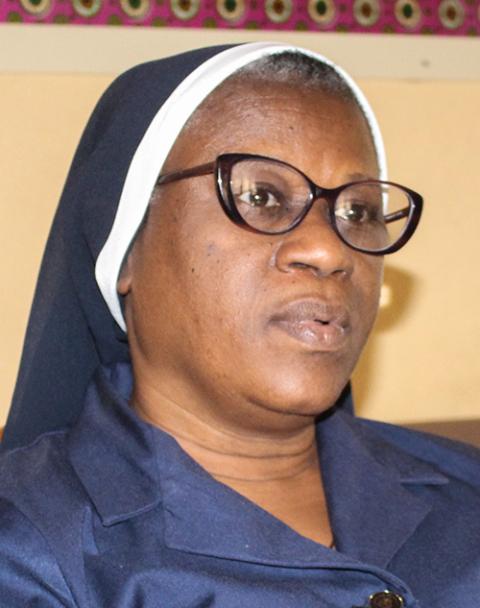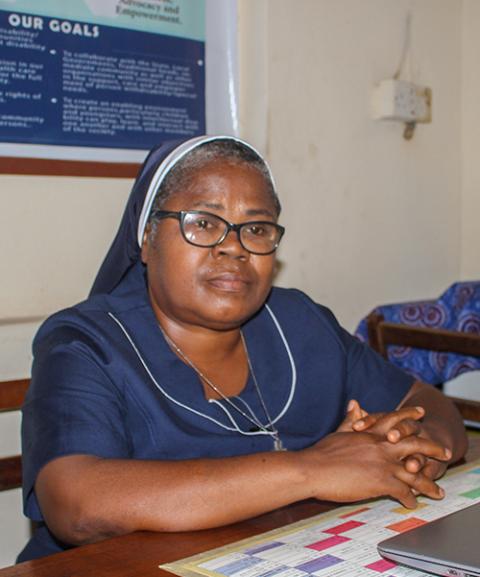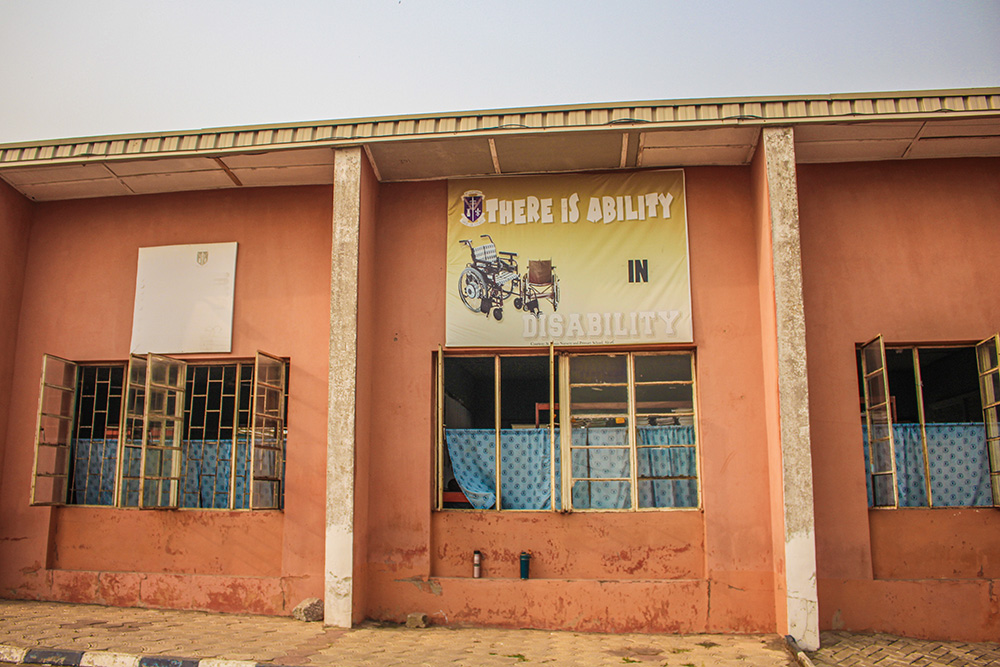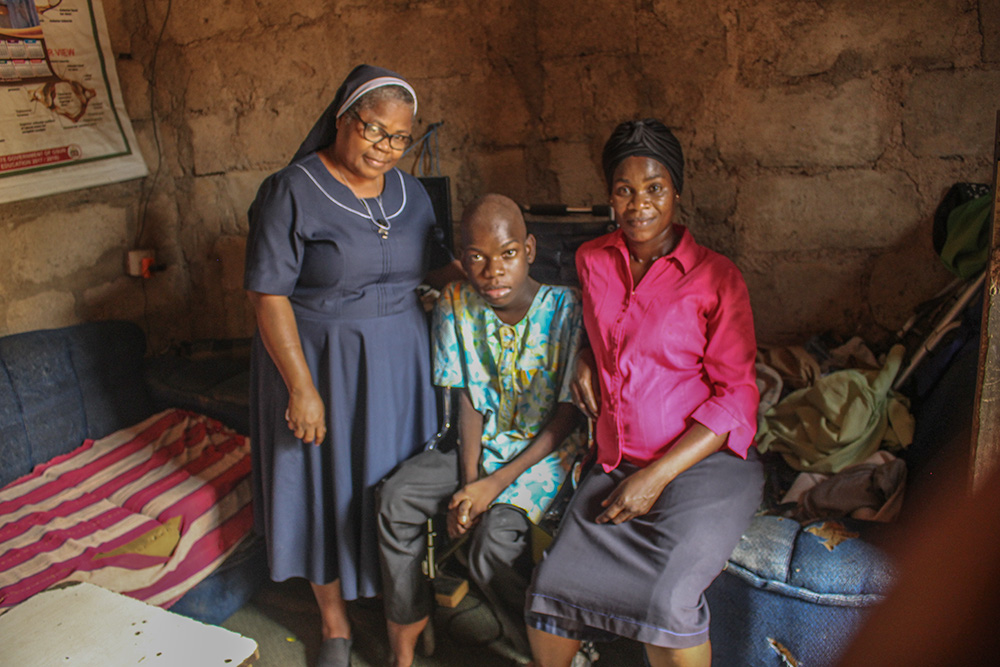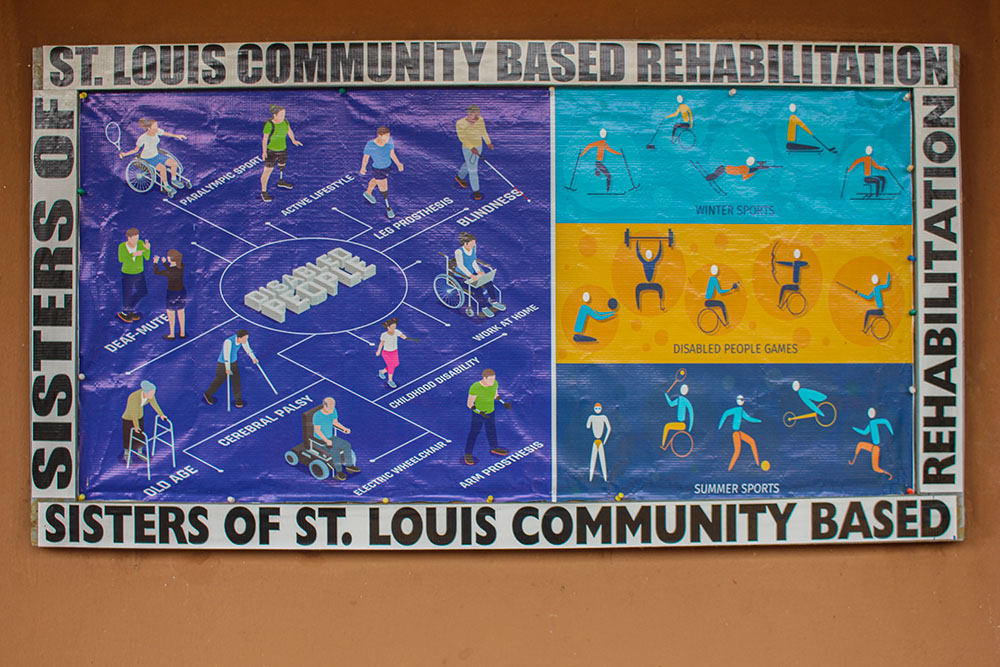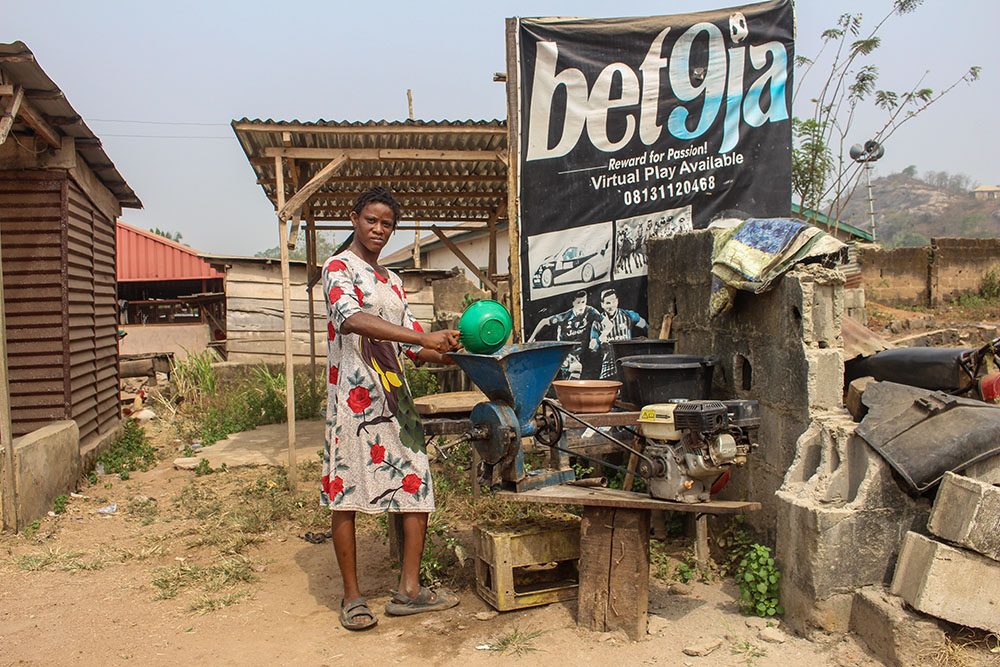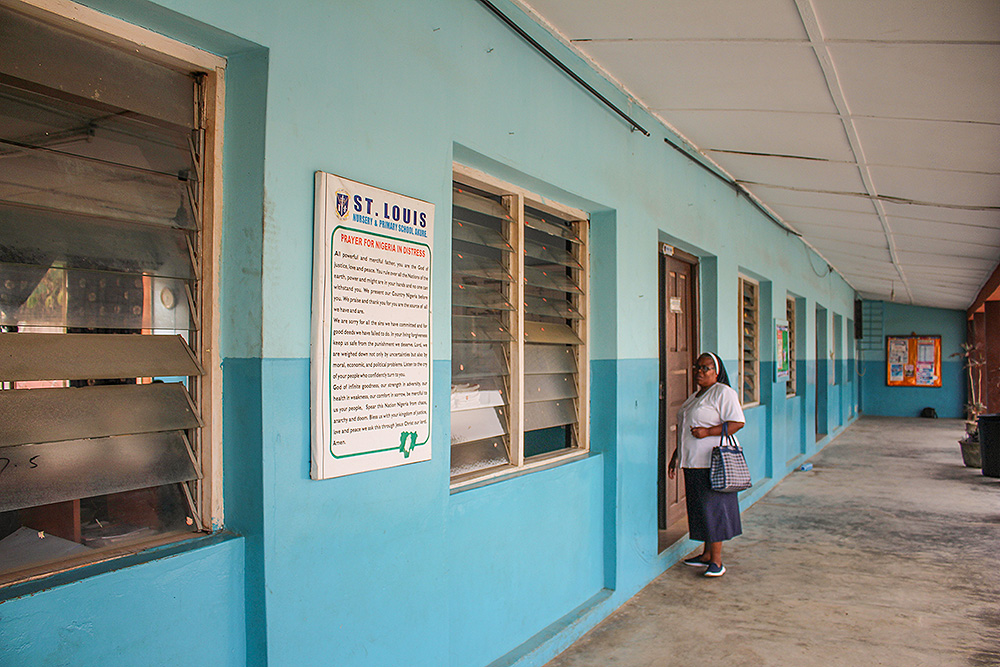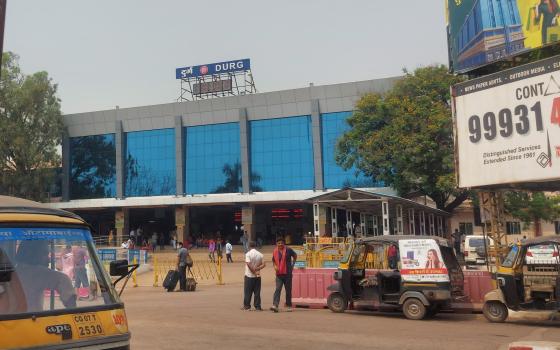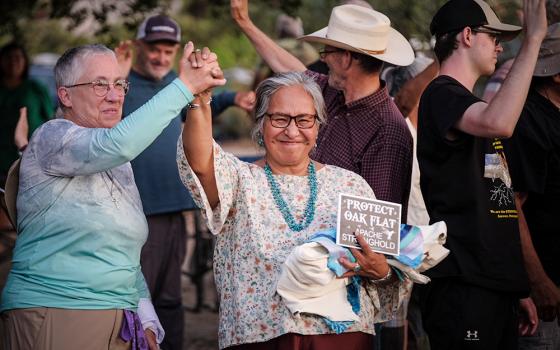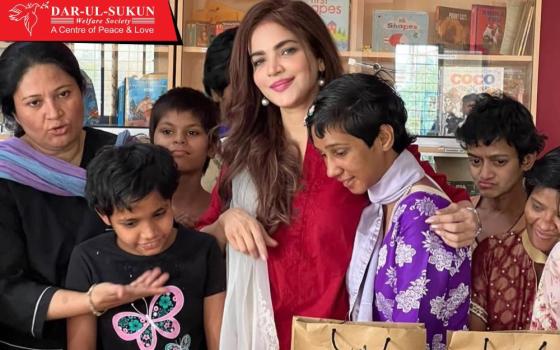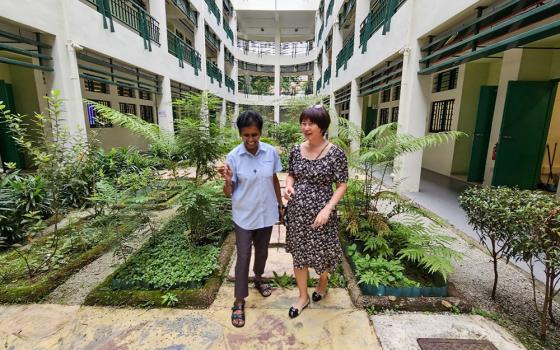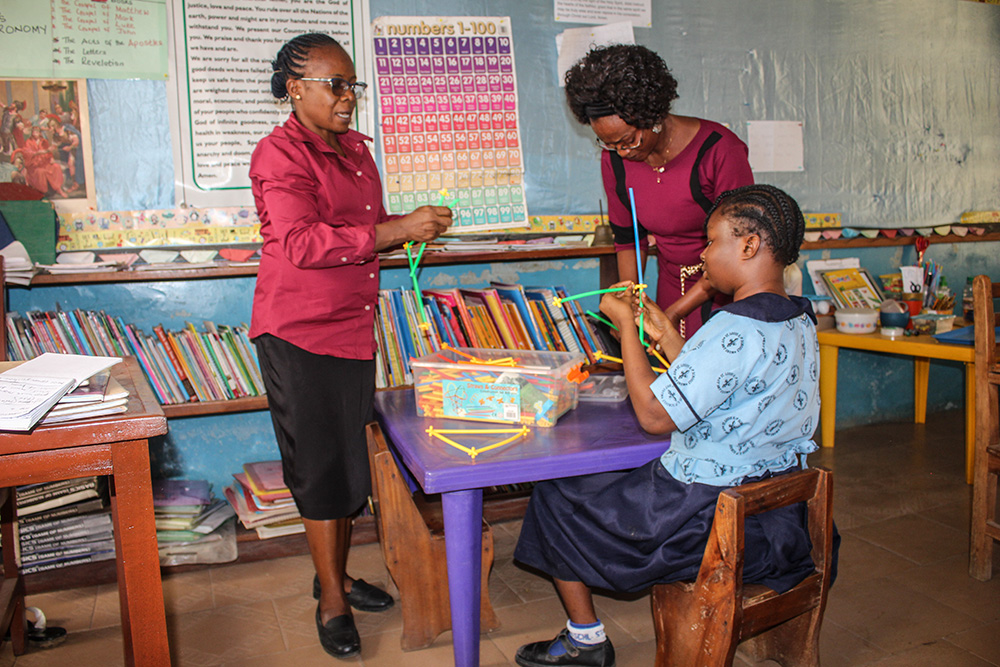
Philomena Ekwe (left), one of the teachers at St. Louis Nursery and Primary School, Akure, constructs shapes using colorful straws. The school is a community-based rehabilitation center where the Sisters of St. Louis provide holistic intervention for persons with disabilities. (GSR photo/Valentine Benjamin)
In 2017, 34-year-old Kehinde Adigun-Opeyemi gave birth to her first and only child, Emmanuel Adigun, through a cesarean section at the Nigeria Police Hospital in the heart of the capital city of Ondo, located in the southwestern corner of Nigeria. But she did not fully understand his development until a midwife told her that he had spina bifida and talipes, known as clubfoot.
Spina bifida is a congenital disorder in which a developing baby's spinal cord fails to develop properly, and talipes occur when a baby's foot is twisted out of shape or position during birth.
Kehinde's joy for her newborn baby never dampened. She and her husband, alive then, were referred to a federal government-owned hospital in Owo — a city in Ondo. When they arrived, a midwife abruptly told them, after examining then-2-month-old Emmanuel, that he was too underweight to undergo any corrective surgery.
"My baby was placed on a weighing tray, and he weighed 2.8 kilograms, a far cry from his 3.5 kilograms when he was born," Adigun-Opeyemi told Global Sisters Report.
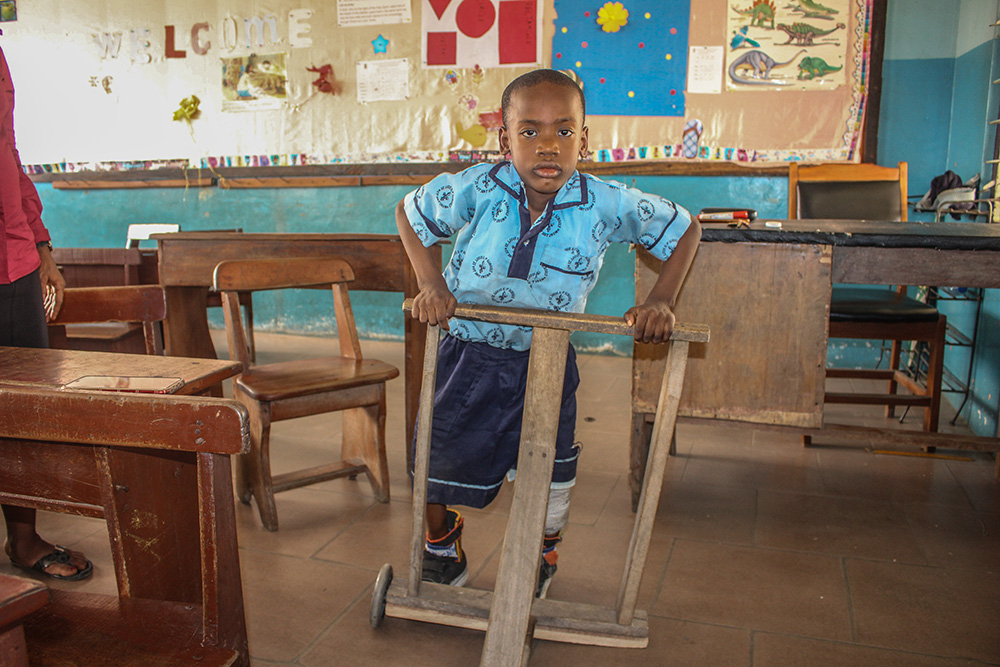
Emmanuel Adigun, photographed on Jan. 31, is a student of St. Louis Nursery and Primary School, Akure, a community-based rehabilitation center where the Sisters of St. Louis are providing holistic intervention for persons with disabilities. He was born with spina bifida and talipes. (GSR photo/Valentine Benjamin)
Emmanuel, now 6 years old, is accessing inclusive education at St. Louis Nursery and Primary School, Akure — a community-based rehabilitation center where the Sisters of St. Louis are providing holistic interventions for persons with disabilities. He is still battling with his condition.
The sisters' program focuses mainly on children with disabilities and the sexual reproductive health rights of females with disabilities to enable them to have a satisfying and safe sex life and protect them from all forms of sexual violence.
Sr. Justina Ihechere, the school's administrative head, told GSR that a full-time program with an inclusive curriculum for students was necessary when her congregation discovered in 2021 that the regular classroom teaching within the regular education environment wasn't helping children with disabilities.
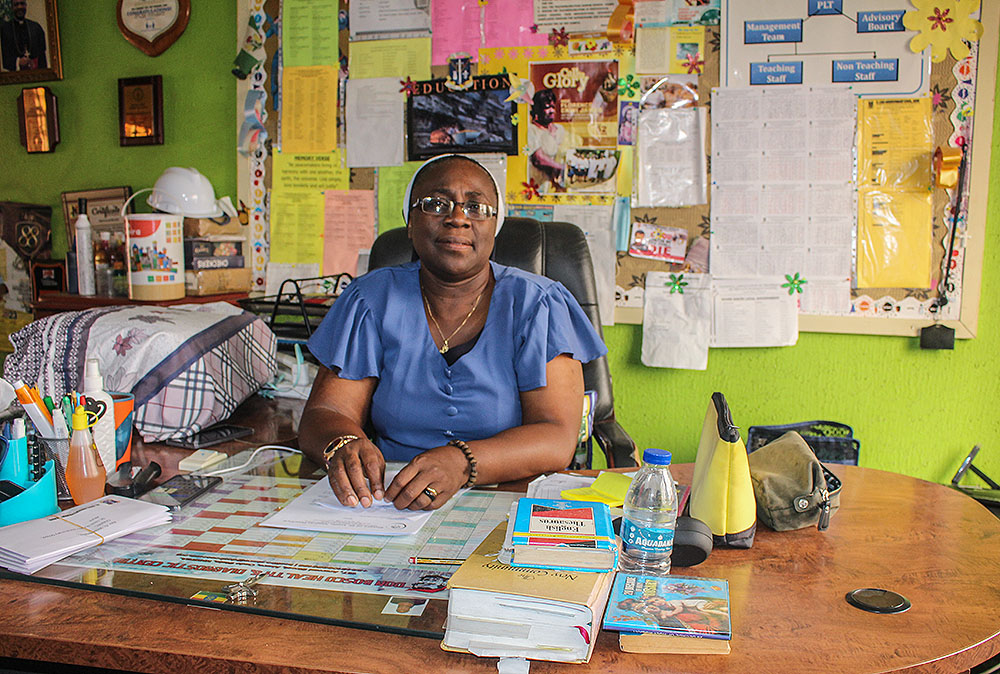
St. Louis Sr. Justina Ihechere, administrative head of St. Louis Nursery and Primary School, Akure, sits in her office Jan. 31. (GSR photo/Valentine Benjamin)
"The children with disabilities were taught in a regular classroom, which is not of any benefit to them. It was more stressful and less advantageous to them."
Nigeria's Discrimination Against Persons with Disabilities Act of 2018 criminalizes discrimination of persons with disabilities with a penalty of a $700 fine for a corporate body and $70 for an individual, or six months imprisonment, or both.
According to new research by the Africa Polling Institute, persons with disabilities still face some marginal exclusion from society, do not have access to public institutions and do not participate in political activities. Children and young women with disabilities are often abused and stigmatized due to the ignorance of those in the communities where they live.
The nuns are working to ensure an inclusive and just society where the rights of persons with disabilities are respected.
Sr. Christiana Udebor says inclusive education is important but is not taken seriously in Nigeria, "and that is why we, the Sisters of St. Louis, came up with this inclusive education program to attend to academic needs of children with and without disabilities."
Udebor is program officer for the sisters' Community-Based Rehabilitation Program, which provides comprehensive rehabilitation services, including education and social intervention, physical therapy and assistive devices, advocacy and community awareness.
The sisters have an individualized education plan to ensure that students with identified disabilities receive specialized instruction and related academic services. For instance, if the sisters work with a student with a biological age of 19 and a mental age of 2, they adapt to create an engaging, fun-filled classroom and give him the confidence he can learn.
Philomena Ekwe, one of the teachers, says she and her colleagues spark the children's attention with instructional materials such as a rubber stamp with different animal shapes, colorful straws and wine-colored eggs to stimulate their interest in learning.
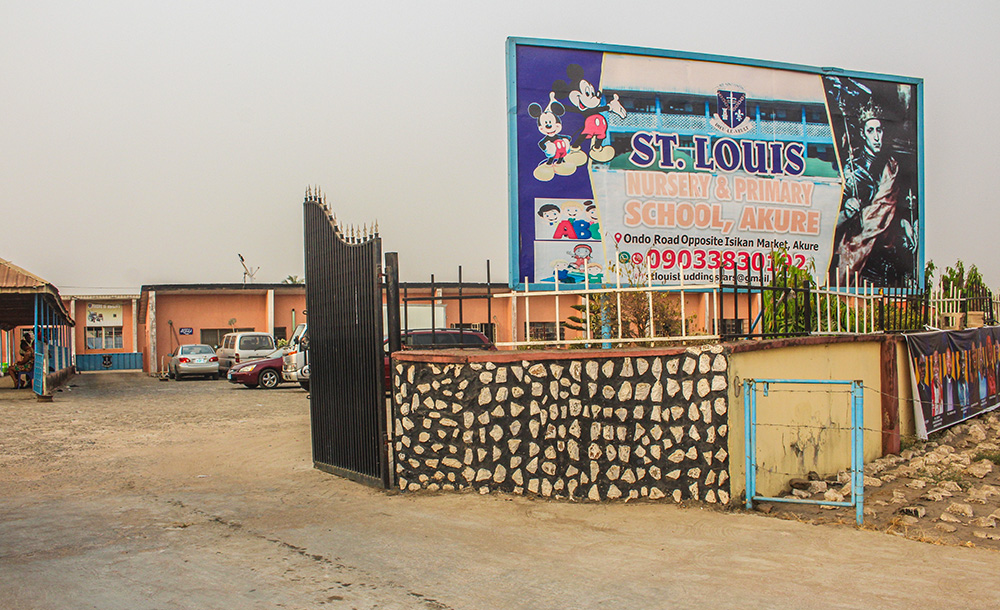
St. Louis Nursery and Primary School, Akure, a community-based rehabilitation center where the Sisters of St. Louis provide holistic intervention for persons with disabilities (GSR photo/Valentine Benjamin)
They also offer training to teachers and parents of children with disabilities to help them interact and share views about their fears and concerns and create more awareness.
Sr. Clara Azubuike, coordinator of the Community-Based Rehabilitation Program, explains that the topics discussed during the parents' workshops are also a springboard for increased awareness among families to educate their children with disabilities about sexual health.
"This helps them accept the reality of the condition of their children, and serves as an environment where parents can talk freely, share experiences and learn ways to cope with the disabilities of their children."
Advertisement
The school also trains teachers to identify different disabilities in the students to help them while teaching them, Azubuike added.
Some of the program's activities include purchasing instructional materials to set up an inclusive classroom and payment of fees for children in hearing impaired and visually impaired schools. The sisters also purchase assistive devices like cerebral palsy chairs for children, provide physiotherapy sessions and corrective orthopedic surgery, as well as anticonvulsant drugs for children with epilepsy.
The sisters have a staff of 86 teaching and nonteaching staff, including four nuns and one special education teacher.
Ofoma Angel, 9, a sixth-grade student at the school without disabilities, said that inclusive education encourages students with and without disabilities to integrate, play board games like chess, monopoly and Scrabble, and do other things together in the school.
"It's one of the interesting teaching techniques the sisters introduced for an inclusive education," he said.
The program is supported by the Liliane Foundation, a humanitarian organization that focuses on inclusive society, equal rights and opportunities for children with disabilities. So far, five out of 23 children have been supported with successful corrective surgeries and reintegrated into society.
Azubuike says they are still observing 6-year-old Emmanuel to know when he is due for corrective surgery.

